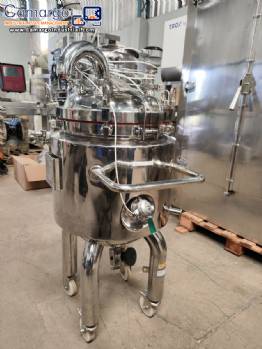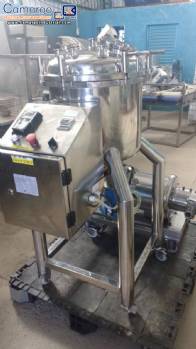Used machines for sale
 Tank reactors for injectable manufacturing Tank reactors for injectable manufacturing
Main brands:
FAE System, Meteor, Pharmainox
|
| Tank reactors for injectable manufacturing |
Pressure reactors (also known as pressurized reactors) play a crucial role in the manufacture of injectable drugs in the human and animal health industry.
1. What is a pressure reactor used for?
Pressure reactors are used to carry out chemical reactions that require higher or more controlled temperature and/or pressure conditions than those offered by the ambient atmosphere. In the production of injectable drugs, these reactors are used to manufacture pharmacological active substances (active ingredients) and to produce certain components required for the final formulation of the drugs, such as emulsions or sterile solutions.
2. How does a pressure reactor work?
A pressure reactor is essentially a sealed vessel designed to withstand internal pressures higher or lower than atmospheric pressure. The operation of a pressure reactor involves strictly controlling the conditions within the equipment to ensure that the desired chemical reaction occurs safely and efficiently. The process inside the reactor is often monitored and controlled to adjust the temperature, pressure, reaction time, and other variables as needed.
These reactors can be positive pressure (where the internal pressure is greater than atmospheric pressure) or negative pressure (where the internal pressure is less than atmospheric pressure). The specific type of pressure depends on the manufacturing process and the nature of the chemical reactions to be performed.
3. Positive or negative pressure?
Positive pressure: The internal pressure of the reactor is maintained above atmospheric pressure. This is usually necessary for processes involving reactions that generate heat, or for maintaining an environment where the reaction fluid needs to be under pressure to improve solubility or prevent evaporation.
Negative pressure: The internal pressure of the reactor is maintained below atmospheric pressure. Negative pressure reactors are used in processes that require a vacuum, such as the removal of volatile gases or solvents, or in situations where it is necessary to avoid external contamination or reactions with atmospheric oxygen. 4. Pressure Reactor Construction Materials
The materials of construction for pressure reactors need to be highly resistant to both pressure and corrosion from the chemicals involved. Some of the most common materials include:
Stainless steel (such as 316L): This is the most common material due to its corrosion resistance and ability to withstand high pressures and temperatures. It is widely used in the pharmaceutical and food industries.
Titanium alloy: Used when there is a greater need for corrosion resistance, especially in processes involving aggressive chemicals.
Borosilicate glass: In some cases, especially on a small scale or in research laboratories, borosilicate glass may be used due to its thermal resistance.
Coated carbon steel: In specific cases where the processes do not require as much resistance to aggressive acids or solvents.
5. Temperature range and operation
Pressure reactors can operate over a wide range of temperatures, depending on the type of process. Typically, the temperature range of pressure reactors can vary between:
Low temperatures (around -40°C to 0°C): For processes that require low temperature conditions, such as certain types of crystallization reactions or reactions that need to be carried out in a vacuum environment (negative pressure).
High temperatures (up to 250-300°C or more): For reactions that require high heat, such as the sterilization of substances or the synthesis of certain compounds that only react at high temperatures.
When the reactor is operating at room temperature (usually between 15°C and 25°C), internal pressure and atmospheric control are the main factors at work to ensure the effectiveness of the process.
6. Pressure reactors in the manufacture of injectable drugs
Purpose: In many injectable drug formulations, it is necessary to carry out reactions or mixing in a controlled manner to ensure the purity and efficacy of the drug. The pressure reactor allows these conditions to be maintained safely.
Typical processes: Production of monoclonal antibodies, formulation of vaccines, sterilization of drugs, and production of solutions and emulsions.
Controls: Strict control of temperature, pressure, and often also of humidity and internal atmosphere, to ensure that there is no contamination and that the final products are safe for use.
Conclusion
Pressure reactors are essential for the production of injectable drugs, providing the necessary temperature and pressure control for chemical reactions that require specific conditions. They are constructed from durable materials such as stainless steel or titanium and can operate over a wide range of temperatures and pressures, depending on the need. |
|
|
|
 |
Brand: FAE System
Pressure reactor for handling injectable human and possibly injectable animal medications (animal health industry).
With agitation in the lower part.
Manufacturer: FAE System.
Nominal capacity: 50 liters.
With Millipore Optiseal filter.
... |
|
|
 |
Brand: Meteor, Pharmainox
Components: Novus, Siemens, WEG
Pressure reactor for manufacturing of hormones.
Brand Name: Meteor, Pharmainox.
Specifications:
Useful / total capacity: 50 L.
Working pressure: 0.5 kgf / cm².
Design pressure: 1.0 kgf / cm².
Maximum permissible working pressure at ... |
|
|
|
|
Visitation: Schedule date for visitation and check equipment availability. Merely illustrative images.
|
|
|
| |
|
|
Photos and images sent by email will be considered as ad authorization on our websites and marketing.
Camargo Industrial has no responsability for the data delivered by the advertiser, (Operation, technical, maintenance, warranties, technical delivery) and registration of the same data, exempting Camargo Industrial responsibilities on the veracity of the information described, civil and criminally.
The advertiser declares that the equipment is their property, settled without alienation, pending fiscal or judicial attachment.
Standard Work Safety of Machines and Equipment (NR12): 12.1.1. Camargo Industrial does not participate in the use phase construction, transport, assembly, installation, adjustment, operation, cleaning, maintenance, inspection, decommissioning and dismantling of machinery or equipment, any such liability of the seller attributes and / or buyer, relieving - any responsibility Camargo Industrial.
|
 |
| |
|





